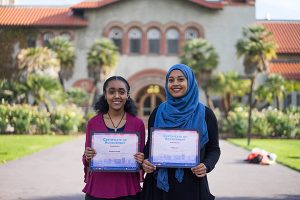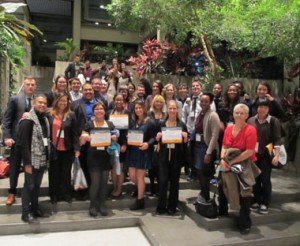
Undergraduate students Mulatwa Haile, left, and Nebat Ali, received awards for their research presentations at the Annual Biomedical Research Conference for Minority Students in November. (Photo: James Tensuan, ’15 Journalism)
By Melissa Anderson
Mulatwa Haile and Nebat Ali have several years of research experience between them—and recently received an award for presentations of their work at a national conference—though they are both still in their junior year as undergraduates at San Jose State University.
The students applied to be part of programs on campus that aim to give research opportunities to undergraduate, underrepresented, students in the fields of science, technology, engineering and math (STEM).
Haile, a biological sciences student with a concentration in systems physiology who is minoring in chemistry and also hopes to complete an African American Studies minor, applied for the Research Initiative for Scientific Enhancement (RISE) program. Ali, a biological sciences student with a concentration in microbiology, started out with the Louis Stokes Alliance for Minority Participation (LSAMP) and worked wi Dr. Miri VanHoven.
“I got accepted to (Dr.) Katherine Wilkinson’s lab in the biological sciences department,” Haile said. “Ever since then I have developed my love of science and research.”
She noted that as an undergraduate it is challenging to balance working in a lab where she can learn techniques and make connections that will benefit her in the future while also finding the time to study. One of the most valuable lessons she learned is time management and trouble shooting. The students are now involved in Maximizing Access to Research Careers Undergraduate Training in Academic Research (MARC U-STAR) program.
“Both the programs have made the gap between me and my ambition smaller, whether that be financially by offering support or by providing an oasis of information,” Haile said, humbly adding, “I am extremely grateful for the diversity programs. They have given the not-so-extraordinary-me an opportunity to do extraordinary things.”
Ali agreed that the research experience has helped her in many aspects of her educational career, including applying concepts from class to the experiments with which she is involved.
“These programs really helped guide me and provide a network of students and professors to connect with,” she said. “These programs provide an amazing support system for us minority students that bridges the gap between undergraduate and graduate school.”
Last fall, they traveled to the Annual Biomedical Research Conference for Minority Students (ABRCMS) in Phoenix, Arizona, where they connected with more than 2,000 like-minded students to present research findings. The SJSU cohort included 25 students who presented 16 posters and conducted two talks, with the support of faculty members Dr. Karen Singmaster, Dr. Alberto Rascon, Dr. Cleber Ouverney and Wilkinson.
Haile presented her research on the effects of obesity on spinal cord excitability and Ali presented work on how nematodes evolved to avoid Streptomyces bacteria. The two were among the select students from across the nation to receive awards for their presentations.
“I have attended regional professional conferences, but not one that was so large,” Ali said. “ABRCMS was my first national conference. It was an incredible learning experience and everything from the speakers to the exhibitors weregreat.”
Ali noted that historically white males have dominated the field of science.
“Going to ABRCMS and seeing the diversity and all the minorities represented there made me think of all the potential that lies within those that are underrepresented in the fields of STEM,” she said. “Having these programs for underrepresented students is one crucial step in breaking the barriers that restrict us from attaining our full potential.”
In addition to RISE, LSAMP and MARC, the university has other programs that support research opportunities for undergraduate students who are underrepresented in STEM fields. These include the McNair Scholars Program, Research by Undergraduates Using Molecular Biology Applications (RUMBA) and S-STEM. The programs are funded through a variety of federal grants and many students who have participated have gone on to complete doctoral programs.
“The two awards confirm that the research taking place on our campus is meaningful and that our students are as competitive as those at top research institutions in the nation,” Ouverney said.

